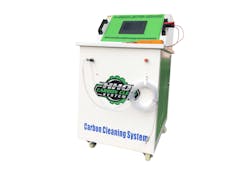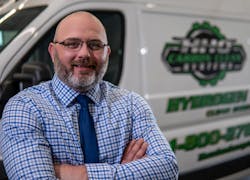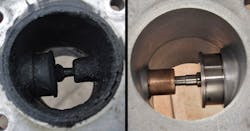Mobile service busts engine carbon to restore 'super' performance
Last summer, when Greg Williamson, owner of A&W Express, had an issue with a stuck turbocharger actuator on a Volvo VNL 630 engine, he did not worry about the possibility of spending thousands on repairs and having one of his 11 trucks out of service for two or more days. The Brookport, Ill.-based fleet owner just made a call to HHO Carbon Clean Systems.
The mobile engine-cleaning company had just opened about 10 miles downstream of the Ohio River in Metropolis, Ill., and through its standard service had already vaporized the carbon buildup in his fleets’ engines with the efficiency of a "blast of Superman’s heat vision," allowing his fleet to run more efficiently as well.
HHO’s solution was born on Earth, though not often found in North America. Developed in Europe, the hydrogen carbon cleaning machine, called the HHO 1500, comprises a hydrogen generator and hose that sustainably removes carbon leftover from the combustion process out of engine components including pistons, cylinders, turbos, EGR valves, and catalytic converters, as well as diesel particulate filters.
“Through electrolysis, we turn water into hydrogen,” explained founder Jared English, a repair shop owner who developed the business idea at the start of the COVID-19 pandemic while a new facility was being built. “Once our hydrogen-water mixture enters the combustion chamber, the hydrogen ups the combustion temperatures, the water soaks into the carbon and acts as a mild solvent, and we yield a chemical reaction that causes a phase change in carbon, so it hitches a ride with unbound hydrogen molecules and comes out of the engine as a gas.”
This is vastly different than the chemical-based alternative that can burn the skin and produces thick fumes that pollute the environment and workers’ lungs.
“Because this process has zero emissions, we actually lower emissions while we're performing the service,” English said. “It works better than harsh chemicals, which push out black smoke and actually contaminate other components in the engine with large carbon particles that break off in chunks when using harsh chemical solvents. So it's a win-win for several different categories.”
A key benefit for fleets is that HHO will send a technician in a Ram ProMaster 1500 van that serves as a mobile worksite right out to the truck yard. The business will send a technician within about a two-hour range from home base in Metropolis to perform the on-site service.
The cleaning takes 45 minutes and Williamson found on average a cleaning improves fuel efficiency by 9%. The truck idles while the tech performs the process.
“Carbon is like a sponge,” English said, “so it soaks up hydrocarbons. Just by cleaning that out, and cleaning the turbos and making everything run more efficiently, we are restoring the fuel mileage to factory.”
Working on engines since he was a teenager had helped English pinpoint the issue of carbon buildup and what components are most impacted.
“I knew it especially plagues diesel engines in the variable geometry turbos and the diesel particulate filters,” English said. “I wanted to make sure to focus on those troubled areas, and that's where we really shine — on the turbo and DPFs.”
Keeping an eye on the DPF’s differential pressure and the Turbo PSI (Boost) gauge are good ways to tell if an engine is due for cleaning. “If you've lost one or two psi of boost over time, then we know that the variable geometry turbo is probably carboned up,” English said.
He added that along with preventing turbo failures, the service can extend DPF life by 100,000 miles.
In the case of the stuck actuator, the cleaning resolved the issue and saved Williamson from dropping $5,000 for new parts.
“In the last two years I saved $10,000 in turbos, plus the fuel savings,” said Williamson of the cleaning process. He used a similar service recommended by his Mack dealer a year earlier to clear a Mack MP8 engine’s turbo. “It cleans the carbon and puts more money in your bottom line for $200 less than the price of an oil change.”
The hydrogen-based cleaning is now part of the fleet’s regular preventive maintenance schedule. With A&W’s annual fuel expense at $600,000, including carbon cleaning in their preventive maintenance program yields $54,000 in savings. HHO also cleans agricultural equipment and natural gas engines.
Third-party testing revealed fleets could expect around a 9% increase in fuel economy, 12% decrease in cost of repairs, and 8% reduction in downtime. The 45-minute cleaning typically decreases DPF pressure by 10% but cannot prevent failure in units that have become overly restricted and begun near constant regeneration. For a system that is 50% restricted, a teardown cleaning would be required. Bi-annual cleanings can prevent this.
Reflecting how services have adjusted to fleet demands, HHO will make site visits at the most optimal time depending on the duty cycle, said Cord Koch, HHO director of marketing & franchise development.
“For concrete trucks, we would schedule that for a rainy day,” Koch said. “If it's a municipality that only runs their vehicles Monday through Friday, then we come in on a Saturday.”
HHO’s plan for growth relies on the adoption of franchises. One franchise has already opened in Evansville, Ind., and another is opening soon in Western Kentucky.
“Our goal this year is 10,” English said. “We're not setting real high goals because we're more about quality of people and the quality of our territory, so we spend a lot of time finding the right people, making sure they get the right territories and the best equipment to work with.”
Targeted territories include Nashville, Memphis, and St. Louis.
Koch sees a business model where a franchise can make site visits a few days a week and the others set up at a truck stop (which would require revenue sharing) and perform cleanings for owner-operators who are in their hours of service break period.
About the Author
John Hitch
Editor
John Hitch is the editor-in-chief of Fleet Maintenance, providing maintenance management and technicians with the the latest information on the tools and strategies to keep their fleets' commercial vehicles moving. He is based out of Cleveland, Ohio, and was previously senior editor for FleetOwner. He previously wrote about manufacturing and advanced technology for IndustryWeek and New Equipment Digest.




